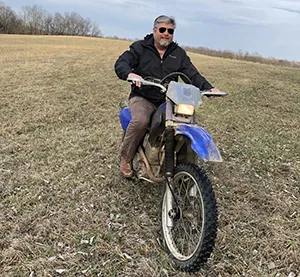When most people near their 50s, they start thinking of retirement and easing into a slower-paced lifestyle. But for one University of Kentucky College of Communication and Information alumnus, nearing his 50s meant doubling down with both work and school.
In 2015, Brad Mitzelfelt decided after a lengthy and successful career that his resume needed to be “sharpened.” By December 2020, the 53-year-old graduated from the University of Kentucky’s College of Communication and Information with a master’s in communication while maintaining his full-time employment. And now, a large project he worked on during his graduate program and on behalf of U.S. Department of Energy has been completed.
While it isn’t unusual for graduate students to hold down a job to support their studies, Mitzelfelt had been enjoying a full career long before deciding to re-enroll in college. From the military to the building industry to government work to public affairs, Mitzelfelt had much more work experience than classroom experience, contrary to many of his peers.
Mitzelfelt entered the Marines in 1986 after high school. After going through the Defense Information School, he served six years as a combat correspondent and public affairs specialist.
After leaving the military in 1991, Mitzelfelt enrolled at the University of Southern California as a journalism major to build upon the foundation he had laid in the military. But after three semesters, he soon realized he had already lived the experiences of the course lessons. He would later earn his bachelor’s in business and management in 1998 from the University of Redlands, but not before entering the workforce. Throughout the 1990s and 2000s, Mitzelfelt worked in and around California government and politics.
At the end of his term in several senior positions, Mitzelfelt found himself nearly facing a “mid-life crisis.” He was struggling to find more work in California despite his decades-long, successful political career. But instead of continuing his job search on the west coast, he decided to try something entirely new in the South.
In 2013, Mitzelfelt made his way to Kentucky to work as a public affairs specialist for Strategic Management Solutions, LLC, then as a senior public affairs specialist for Enterprise Technical Assistance Services, Inc. Both companies worked for the Portsmouth/Paducah Project Office in Lexington, part of the DOE’s Office of Environmental Management. The DOE partnered with the UK Center for Applied Energy Research’s Kentucky Research Consortium for Energy and Environment to, among other grant-funded projects, design a virtual museum that presents the history of the Paducah Gaseous Diffusion Plant, the country’s last operating government-owned uranium-enrichment facility when it was shut down in 2013. The PGDP Virtual Museum launched in November 2021.
It was UK’s connection to the DOE that caught Mitzelfelt’s eye when he was looking to get his master’s degree. He was particularly interested in the 2011 DOE-sponsored research on community opinions about the Paducah Site environmental cleanup, a project completed by Chike Anyaegbunam, professor and chair of the Department of Integrated Strategic Communication. Though Mitzelfelt had decades of experience in politics and government, he considered communication his specialty and wanted his education to reflect such.
“There’s only so much you can learn through experience,” Mitzelfelt said. “At some point, you have to study, research and think about your discipline. And this graduate program forces you to do that.”
It had been almost two decades since the last time Mitzelfelt was in a classroom, so he felt that UK had “taken a chance” on admitting him. After all, he had only taken one communication class at USC beforehand while all his communication experience came mostly from work. Even so, he felt it was “never too late” to revisit his education.
Mitzelfelt was admitted into the master’s in communication program in 2015. For the next five years, he took one class at a time while managing his family life and career.
While Mitzelfelt held that communication had always been his specialty, he had never thought of the philosophical and theoretical foundations of communication. He said the theory course he had to take was the hardest in the entire program, pushing him to apply theories to his understanding of the field and his own work.
Since Mitzelfelt felt the work he does was like that of Anyaegbunam, whose work was what initially inspired Mitzelfelt to join CI, he felt fortunate to have the professor as an instructor and chair of his graduate committee.
“Brad’s the true definition of a professional student, who’s always on the lookout for how what we are discussing in the classroom will be applied professionally in his work,” Anyaegbunam said. “He came to the CI graduate program in communication with the singular aim of improving his expertise in the field of public affairs and I must say he succeeded. We all learnt a lot from Brad as he always brought his experiences from the professional field into our classroom.”
While Mitzelfelt rose to the challenges of working and studying, he credits the program’s non-thesis track for alleviating some of the stress of being a full-time working student. In fact, he believes if it wasn’t for that option, he might not have been able to earn his degree. However, in the end, he felt it was worth the effort.
“It was a challenge to juggle all that, but I think it was a great decision because it got me out of my comfort zone to the extent that I had already learned through thirty years of on-the-job experience,” Mitzelfelt said. “I learned a lot, but I never really thought about communication in the ways that academics do. I think I’m a much more knowledgeable communicator now than I was before the program.”
